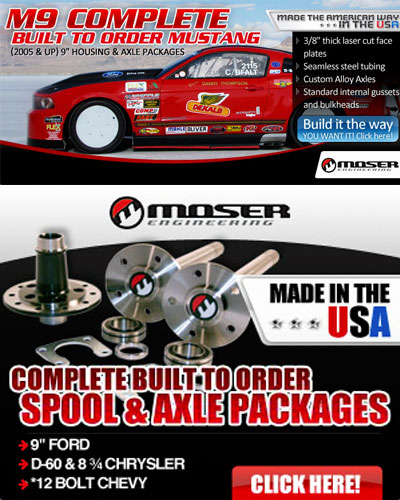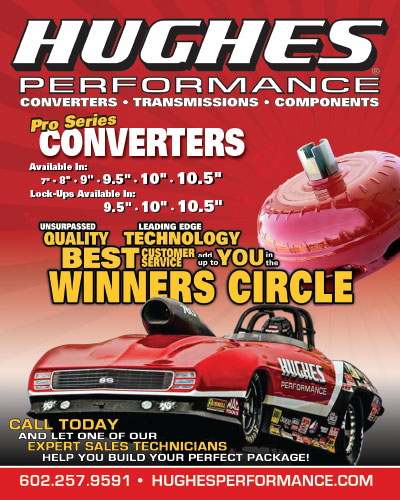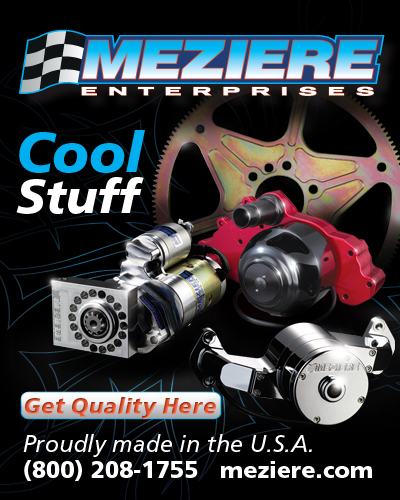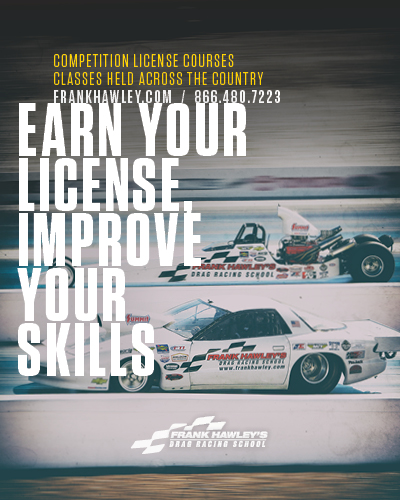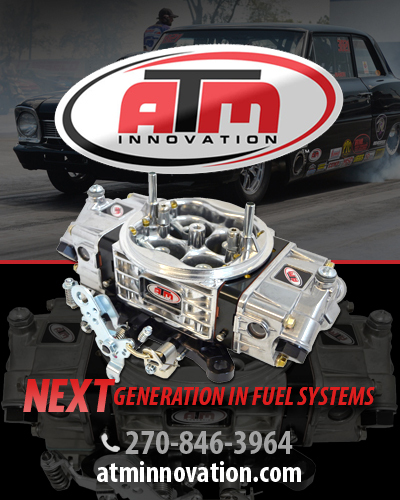BEAL LEAVES LEGACY OF LOVE, FOR SPORT AND HIS GRANDSONS
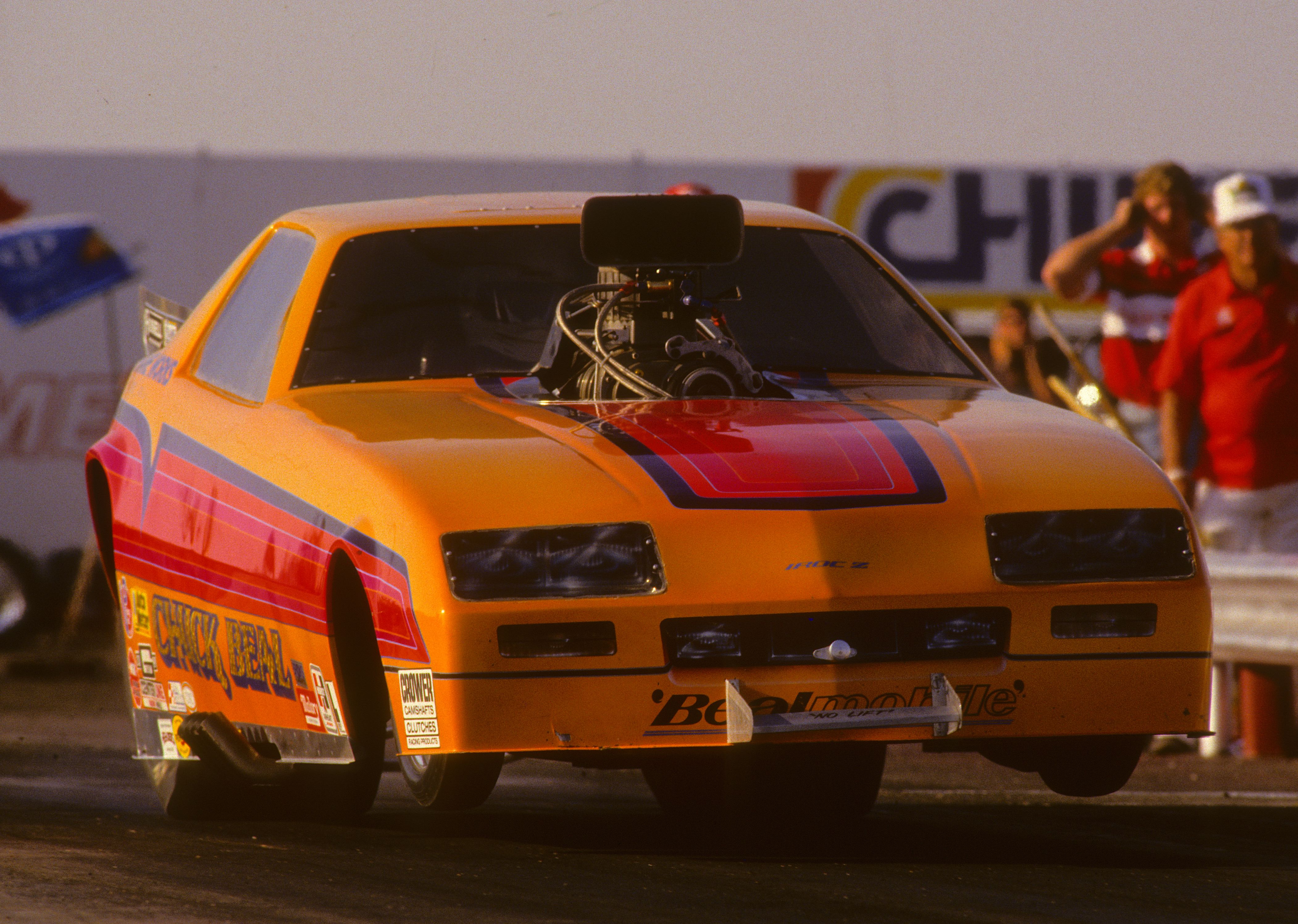
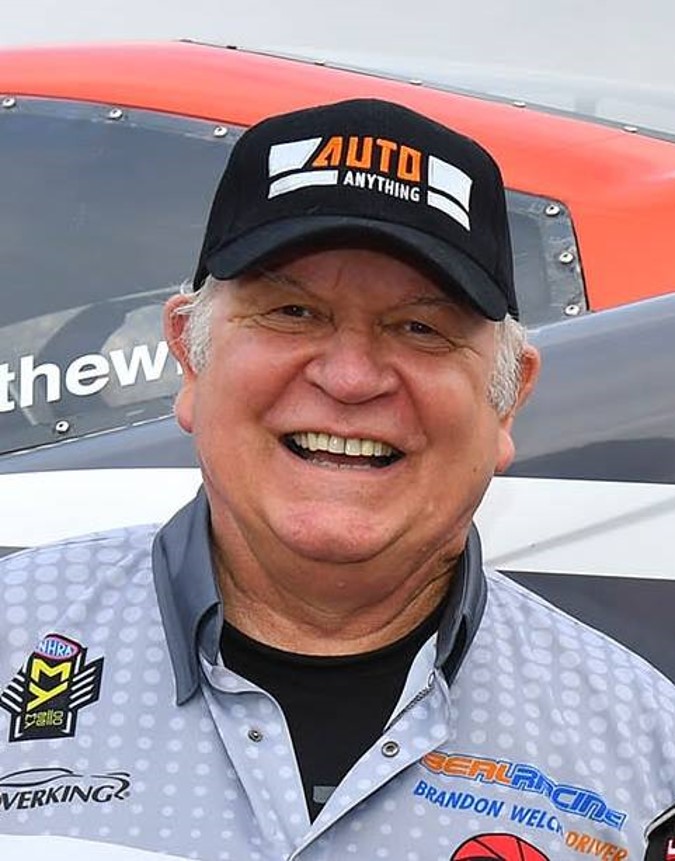
It’s easy for relatively new drag-racing fans to miss out on the joy of appreciating some of the sport’s pioneers. The legends of “Big Daddy” Don Garlits, Shirley Muldowney, and Don Prudhomme, for example, are well-documented, along with those of high-octane personalities such as “TV Tommy” Ivo, “Jungle Jim” Liberman, and John Force.
But with Chuck Beal’s passing July 13 at San Diego, another opportunity has vanished.
The former West Coast match-race ace and two-time Winternationals winner drove both front- and rear-engine dragsters until the late 1970s, switched to the Alcohol Funny Car class and competed there until the early 1990s, then stepped up to the nitro Funny Car ranks in 1994. He won his share of races but never had the luxury of abundant funding, but he was no pushover and scored plenty of upsets as he raced within his means.
“Chuck is one of the originals,” grandson Brandon Welch said, “and he was prolific in the ‘80s with the alcohol cars and was always known with the nitro cars in the late ‘90s and early 2000s that he didn’t run that often but when he did, he ran well on a really low budget.”
Prudhomme recognized that. “They’re the unsung heroes,” he said of Beal and his racing colleagues who competed for the love of drag racing.
But maybe Beal’s finest hour came in the fall of 2015, when he took his race car to Las Vegas as an owner-tuner and for the first time at an NHRA national event watched one grandson, Welch, drive it and another grandson, Tyson Porlas, working on the crew. He and wife KB beamed in the staging lanes, as proud of their contribution to Generation Next as they would be if the two were receiving the Nobel Peace Prize or blasting off to the International Space Station. Chuck Beal had passed the baton. And Welch was fitting together all the puzzle pieces his grandfather had provided.
“I always knew I wanted to drive the race car,” Welch said, “but I was kind of intimidated or kind of scared to ask for that opportunity long-term. But I brought it up finally when I was 13 or 14 years old, and he was always clear from the beginning that ‘You’ve got to work on the race car, and you’ve got to be a respected crew member and understand the mechanics of the race car.’ ”
So Welch has turned wrenches on the family-owned car for half of his life.
“I started working on the car when I was 17 and a senior in high school and have worked on it ever since,” the 34-year-old said.
His impressed grandpa Beal said just before Welch’s driving debut, “He has learned this thing from the inside out. He has touched virtually every part and piece on this car, in addition to being deeply involved in this business.”
And business has been the key word: “Racing is a business, and we are marketing people first,” Welch said. “In order to pay for these things, we have to understand marketing language and marketing strategy.”
He was channeling Chuck Beal.
“He invested in my development as a human being, as well,” Welch said. “He helped pay for my college education and then sent me to graduate school to get an MBA.” (Welch earned a Bachelors degree in just three years and an MBA at age 23.) It is Beal’s guidance that instilled this business sense in Welch, who said, “I’m going to learn how to hold my own in a boardroom with the CEO of a Fortune 500 company. If I can do that and if I can speak marketing and branding with people, in addition to being able to work on the car, that’s going to provide much more longevity in this sport than just being a good driver or a good mechanical guy.”
Prudhomme recognized that in Welch, which is attribute to Beal. “The Snake” didn’t compete against Beal on a regular basis, but certainly they knew one another – and Prudhomme was courting Welch a decade ago.
“Totally. If we had found a sponsor for him, he was a diamond in the rough when we found him,” Prudhomme said. “I really, really like him. He’s an intelligent, sharp kid. I think a lot of him.”
That is the return on Beal’s investment, more precious than a blockbuster deal itself.
Jeff Diehl earned his Funny Car license in Beal’s car and drove a few races for him, and he said, “I’ve known him all my life. My dad went racing with him in the ‘80s. I got my passion from my dad and Chuck Beal. He’s part of the reason I did it. We stayed very good friends. He told me he was proud of me. That was uplifting. That was cool to hear from him. He said he admired what I was doing.”
A longtime relationship with Beal and Welch is something two-time NHRA champion Del Worhsam and his father Chuck cherish.
“I’ve known him for more than 30 years,” Del Worsham said. “I remember him as long as I remember racing.”
They became even closer as Welch started to race, lending expertise, advice, and encouragement about the Funny Car class to Beal Racing. But proof that the friendship was genuine was Beal’s concern for Chuck Worsham, who has experienced his own set of health issues this year and has missed a few races. Del Worsham said that the day before Beal was to undergo his surgery, Beal was asking about Chuck Worsham and offering well wishes. “He was more concerned about my dad,” Worsham said.
One of the beauties of Beal was his keen intelligence. For 35 years, he was a nuclear quality engineer for General Atomics in San Diego. It manufactures the Predator now, the MQ-1B Predator, the U.S. Air Force’s medium-altitude, long-endurance, remotely piloted aircraft that’s used primarily for intelligence and surveillance but can carry a pair of Hellfire missiles. It has seen combat in Afghanistan and Iraq and interventions in Syria and Somalia, among other regions.
However, the mark of Beal’s intelligence was that he never talked over anyone’s head. He was just as skilled at reducing his knowledge to layman’s terms.
For instance, he explained his job at General Atomics and how it went hand-in-glove with his drag racing: “They make electromagnetic launch systems for the Navy, for aircraft carriers. I was always on the R&D side, the nuclear side. My specialty is non-destructive testing. That’s where you x-ray stuff and use ultrasonic examination. I’m really familiar with just about any material’s characteristics. I’m a registered professional engineer. There’s not too many of us left.”
He said, “We’ve come up with a lot of ideas, and we’ve worked through ’em. All of the experience that I had at General Atomics played into my racing, and all my racing experience definitely played into my logic and outlook and the way I worked at General Atomics.”
One of Beal’s favorite authors was Richard Feynman, who won a Nobel Prize for Thermodynamics. Said Beal, “He said what makes a good engineer or scientist is that he uses three things to go forward: doubt, uncertainty, and ignorance. Being ignorant doesn’t mean you’re stupid. It just means you don’t know.”
And Beal used that principle to teach Welch: “You see a car go down the racetrack and it blows up, blows the body off. Wow – what happened? At that point you’re ignorant. You go down and pick up the car and the side is blown out of the motor and you go, ‘It pitched a rod out of it.’ You take it back to the pits, but you’re still ignorant of what the basic problem was. Then you start taking it apart and you look at it and you see the gear drive’s busted on it. So you ask, ‘Did it break the gear drive and the cam stopped and blew it up, or did a rod break?’ So you’re still have doubt that’s a solution. Once you totally figure it out – ‘We got it down to the key broke on the crankshaft and the hub turned and that caused the gear drive to stop and that’s what blew it up.’ Once you get all that figured out, you’re still uncertain: ‘Was that really what caused it? Or was I screwed up on the tune-up?’ That’s really the way you have to look at it in drag racing,” he said.
Welch got it: “What I take from that is what makes a good crew chief, and a scientist, I guess, is the desire to ask that last question: Was that really it, or could there be other things? Let’s look at the entire ecosystem of what happened and see if there’s a greater problem.”
Ultimately, what happened with Beal, who survived a nasty rollover accident in 1991 and raced for 40 years, was tragic. He underwent a heart procedure in late May and, in his family’s words, “suffered a severe stroke.” The family statement said, “We have been purposely quiet about it out of respect for Chuck, as he has always been private about his health.” Earlier this week, a Facebook post said, “His care has transitioned to focus on his comfort, not his recovery. We appreciate your thoughts and prayers.”
Then a post Friday announced, “Chuck Beal passed away peacefully last night with family and friends at his side. He was 74. He was a man of extraordinary intelligence, passion, and grit. He is survived by wife, KB, daughters Kymi and Teri, and grandsons Brandon, Tyson, and Dylon. He is also survived by a large extended family, including sisters Norma, Annie, Lana, Sandy, and Debbie, and many nieces and nephews. We love you, Pop. You will be sorely missed.”
Welch said the family is planning an Aug. 12 memorial.

























